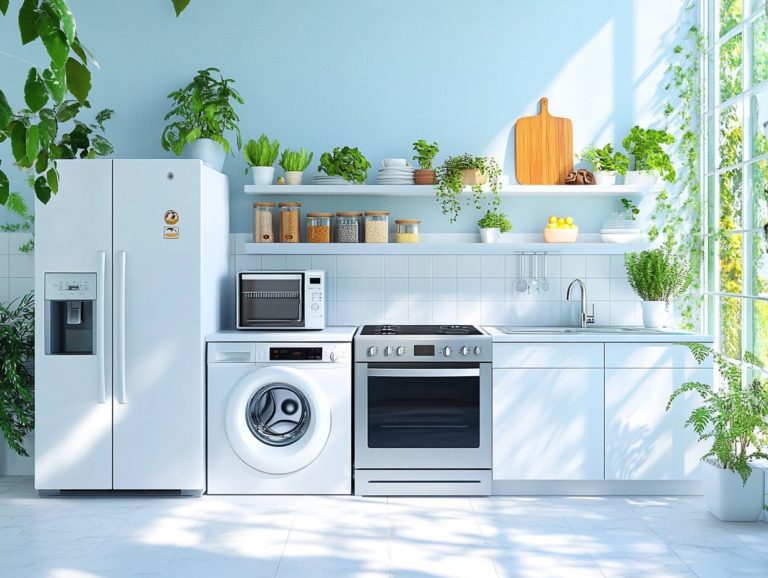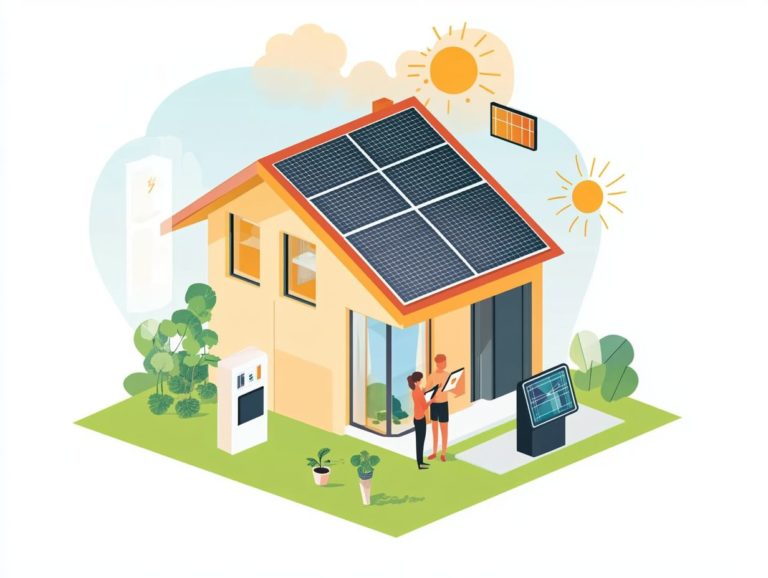What are the Myths About Solar Panels?
Solar panels have become a preferred choice for sustainable energy. Yet, misconceptions continue to obscure their true potential.
You might grapple with concerns about costs, efficiency, or maintenance and environmental impact. These worries can make embracing this renewable technology feel daunting.
Get ready to discover the truth behind some of the most prevalent myths surrounding solar panels. We’ll shed light on their affordability, performance across different climates, and undeniable environmental benefits.
Explore with us as we unveil the truth and delve into the transformative power of solar energy.
Contents
- Key Takeaways:
- What are Solar Panels?
- Common Myths About Solar Panels
- Myth #1: Solar Panels are Expensive and Not Worth the Investment
- Myth #2: Solar Panels are Not Efficient Enough
- Myth #3: Solar Panels are Only for Warm and Sunny Climates
- Myth #4: Solar Panels Require Constant Maintenance
- Myth #5: Solar Panels are Bad for the Environment
- Frequently Asked Questions
Key Takeaways:
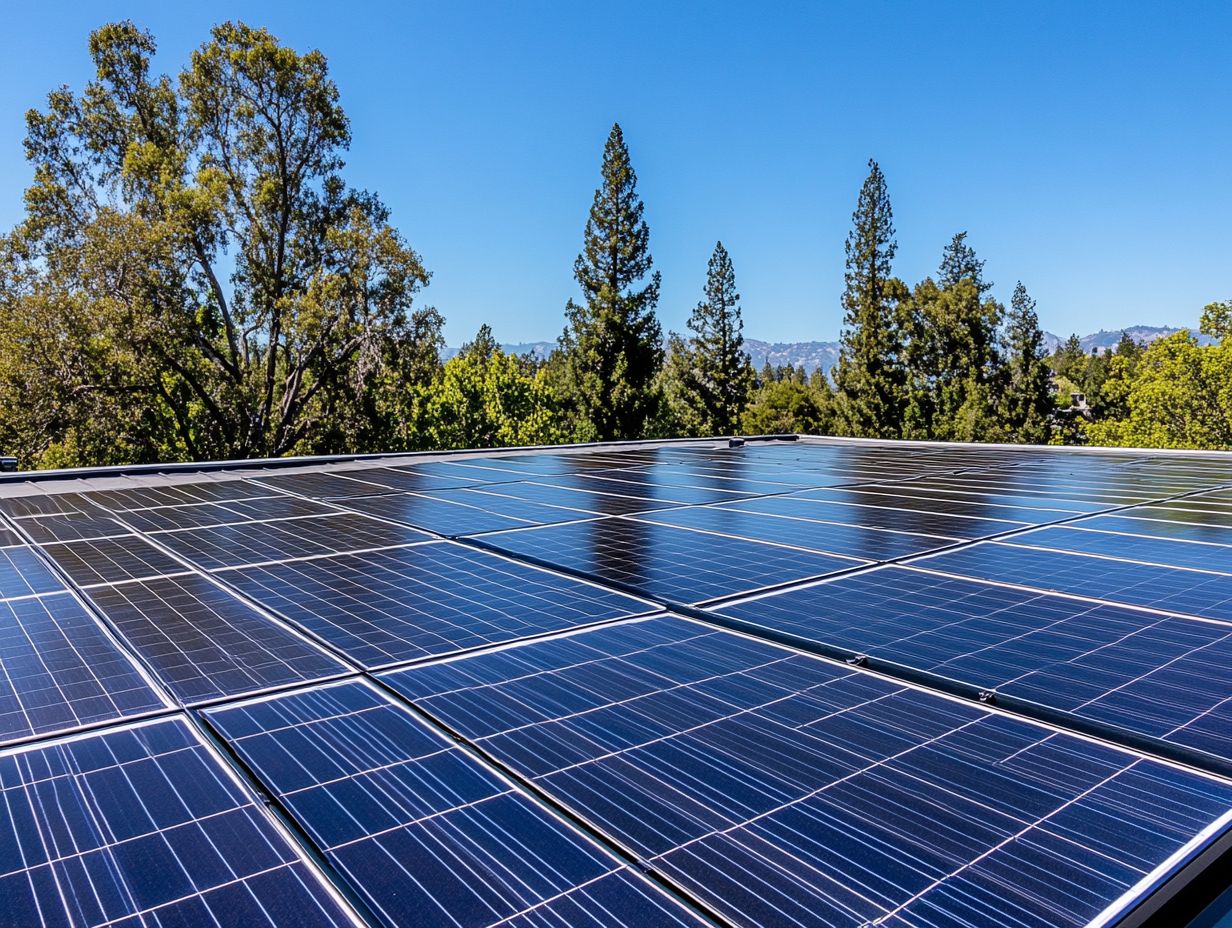
Don’t miss out on the savings and benefits waiting for you with solar panels! Solar panels may seem expensive at first. However, when considering long-term benefits and incentives, they can be a worthwhile investment.
Technological advancements have made solar panels more efficient than ever, making them a reliable source of renewable energy. They can be effective in a variety of climates, not just warm and sunny ones, as long as they receive adequate sunlight.
What are Solar Panels?
Solar panels are remarkable devices that transform sunlight into usable electricity. They allow you to harness the power of solar energy through modern technology.
Typically crafted from silicon-based materials, these panels form the backbone of solar power systems. They enable homeowners and businesses to produce their own clean energy while playing a vital role in reducing harmful gases that contribute to global warming.
The efficiency of solar panels is pivotal for maximizing energy production and achieving substantial savings over time. Thanks to advancements in solar panel manufacturing, the market is becoming more accessible and affordable for residential installations, particularly in regions like California, Hawaii, and Massachusetts.
Common Myths About Solar Panels
Despite the growing popularity of solar energy, you’ll encounter a number of persistent myths and misconceptions about solar panels. These can make you hesitate to invest in residential solar solutions.
Such myths create misunderstandings about the cost, efficiency, and environmental impact of solar energy. It s essential to tackle these misconceptions head-on to raise awareness about the advantages of clean energy.
By doing so, you enable more homeowners to view solar solutions as a viable option for meeting their energy needs.
Debunking Misconceptions
Debunking misconceptions about solar power is essential for cultivating a clear understanding of its benefits. Misunderstandings often circulate around the efficiency of solar panels, their costs, and perceived environmental drawbacks. These can create hesitance when considering a solar investment.
By addressing these misconceptions, you can appreciate the potential of solar energy for enhancing energy savings and minimizing environmental impact.
For example, you might hear that solar panels are inefficient. However, recent statistics reveal that modern panels can convert over 20% of sunlight into electricity, with some high-efficiency models soaring above 23%.
A case study from California illustrates this, showing that a residential solar installation led to average energy savings of 50% on monthly electricity bills evidence of the technology s effectiveness.
Concerns about environmental impact often arise. Yet studies demonstrate that the carbon footprint associated with solar panel manufacturing is negligible compared to the emissions saved throughout their operational life.
These insights emphasize the importance of clear, evidence-based perspectives, enabling you to make informed decisions about embracing solar energy.
Myth #1: Solar Panels are Expensive and Not Worth the Investment
One of the most common myths you might encounter is that solar panels are prohibitively expensive and simply not worth the investment.
The truth is, solar costs have dropped significantly in recent years, thanks to advancements in technology and heightened competition among manufacturers. A range of solar financing options, along with various rebates and tax credits available to homeowners, can make the installation of solar systems more accessible than ever.
This means you can potentially enjoy substantial energy savings over time while investing in a more sustainable future.
Exploring the True Cost and Benefits
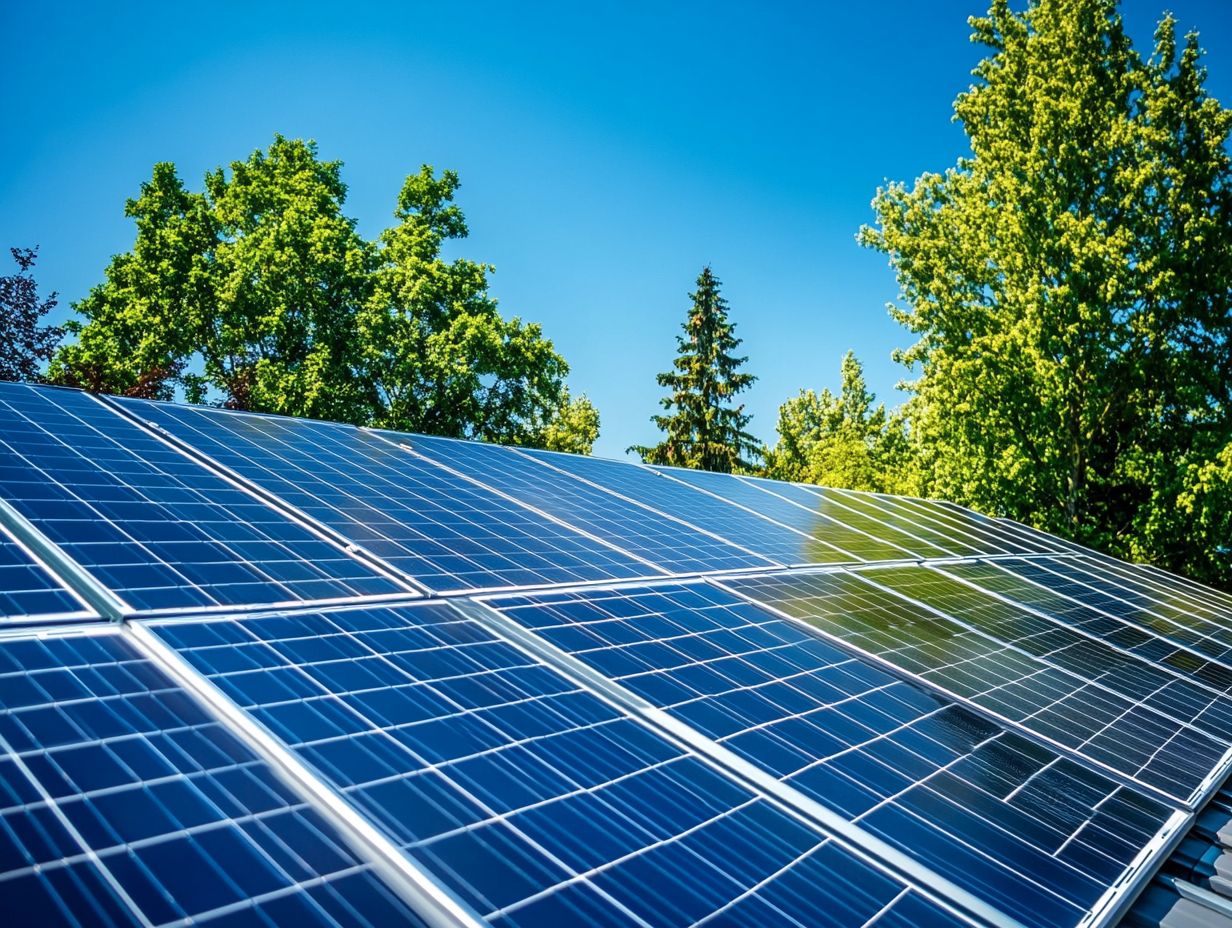
Exploring the true cost and benefits of solar panels reveals a landscape that’s far more nuanced than just initial investment figures. While the upfront costs may raise eyebrows, many homeowners discover that long-term energy production and performance ultimately outweigh these initial expenses.
Consider factors like net metering a system that allows you to earn credit for the excess energy your solar panels produce which can significantly enhance the financial viability of your solar energy system. This allows you to offset your electricity bills and improve your overall financial outlook.
Solar energy safeguards against rising energy prices, locking in your energy costs and offering stability over time. Performance guarantees ensure that energy production aligns with expectations, providing peace of mind and fostering additional savings.
Properties equipped with solar systems often experience increases in market value, making them more enticing to future buyers. Your investment supports sustainable energy practices while contributing to your long-term financial well-being.
Myth #2: Solar Panels are Not Efficient Enough
A prevalent misconception is that solar panels are inefficient, which might lead you to question their suitability for your energy needs. However, it s essential to recognize that recent advancements in solar technology have dramatically boosted the efficiency of these panels.
Today s solar power systems are meticulously engineered for optimal energy efficiency. Many come equipped with performance guarantees that provide homeowners with confidence in their energy production capabilities.
Examining the Latest Technological Advances
Examining the latest technological advances in solar energy reveals a landscape filled with innovation and improved efficiency. Recent developments in solar panel efficiency allow for maximized solar production, even in less-than-ideal conditions, debunking the myth that solar panels are ineffective.
Innovations like bifacial solar panels and advanced tracking systems enhance energy capture, ensuring that you can depend on reliable energy sources. The integration of artificial intelligence in energy management systems achieves significant advancements, allowing for precise monitoring and optimization of your energy use.
This cutting-edge technology adapts in real-time, responding seamlessly to fluctuations in sunlight and energy demand. Developments in perovskite solar cells promise higher efficiency at a lower production cost, potentially transforming the economic landscape of solar energy.
Collectively, these advances pave the way for a more sustainable future, making solar energy not only a viable option but increasingly attractive for residential and commercial applications.
Myth #3: Solar Panels are Only for Warm and Sunny Climates
It s a common misconception that solar panels thrive solely in warm, sunny climates. This myth fails to acknowledge the remarkable versatility of solar energy production in various regions.
While optimal sunlight certainly boosts energy efficiency, today s advanced solar power systems are crafted to perform effectively under a variety of weather conditions. Homeowners in diverse climates, from the rugged landscapes of Idaho to the humid expanses of Louisiana, can confidently embrace solar energy as a viable option for their energy needs.
Key Benefits of Solar Panels:
- Long-term savings on energy costs.
- Increased property value.
- Protection against rising energy prices.
- Support for sustainable energy practices.
Explore solar options today and see how you can save on energy costs! We encourage you to share your thoughts or experiences with solar energy.
Understanding Solar Energy Production in Different Climates
Understanding solar energy production in various climates enables you to appreciate the versatility of solar solutions. Solar panels can efficiently generate energy even in cloudy or cooler conditions, thanks to advanced technology that captures sunlight even when it’s cloudy.
This remarkable capability enhances energy efficiency and reduces the environmental impact associated with fossil fuel dependence.
The production of solar energy is influenced by a range of climate factors, including temperature, humidity, and cloud cover. In hotter climates, solar panels may experience efficiency drops due to elevated temperatures. However, advancements in cooling technologies and panel design counteract those effects.
In areas with high humidity, energy generation may dip, but solar technology can be finely tuned to ensure optimal performance, even in such conditions.
Innovative strategies like tracking systems devices that adjust the panels’ position to follow the sun allow for maximum sunlight exposure, helping to maintain efficiency regardless of local weather challenges.
Myth #4: Solar Panels Require Constant Maintenance
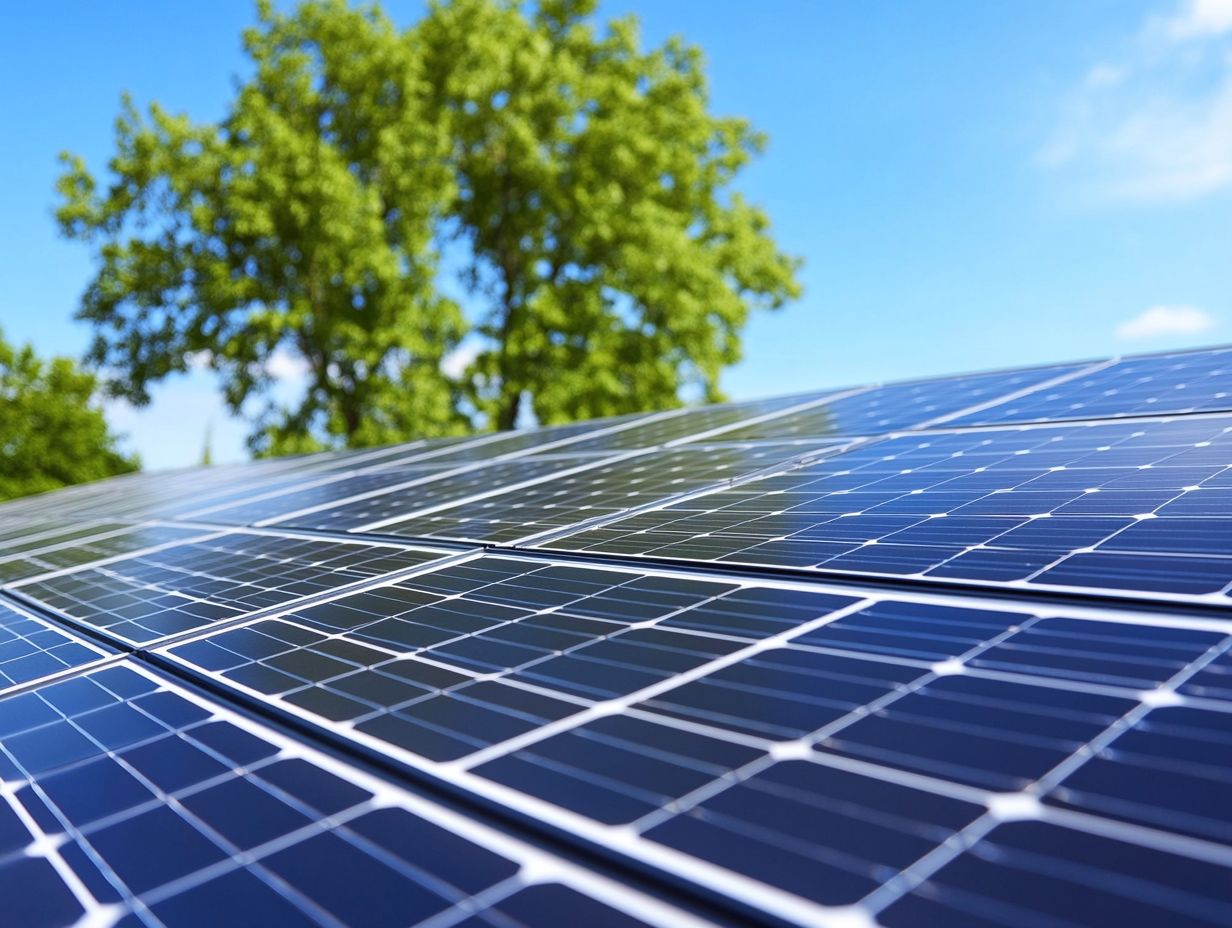
Many people mistakenly believe that solar panels demand constant upkeep, which can deter prospective homeowners from embracing solar energy.
In truth, solar panels are engineered for resilience and require minimal maintenance typically just occasional cleaning and inspection to maintain peak performance.
Many solar systems include warranties and performance guarantees that ease any worries about long-term care.
Dispelling Maintenance Myths
Dispelling the myths surrounding solar panel maintenance is crucial to understand the true requirements of solar systems. Unlike traditional energy sources that often demand frequent and costly upkeep, solar panels usually require minimal maintenance just a bit of occasional cleaning and inspections to keep them running efficiently.
This easy care means you can enjoy your solar investment without hassle, alongside robust solar warranties that provide reassurance about the reliability and longevity of your investment.
Many homeowners share their stories, revealing that simple tasks like rinsing off debris can easily be handled without professional assistance. For example, a couple in California mentioned that their solar system required just a basic inspection once every two years, saving them significant maintenance costs compared to their previous electric systems.
Others noted that routine cleaning has a negligible impact on their busy lives, emphasizing that the benefits of solar far exceed any sporadic upkeep.
Don t miss out on the chance to save money and go green by embracing solar energy today!
Myth #5: Solar Panels are Bad for the Environment
While some may think solar panels are detrimental to the environment, the truth is they significantly contribute to reducing carbon emissions and fostering clean energy.
Yes, there are valid concerns regarding the environmental impact of manufacturing and disposing of solar panels, but the overarching benefits of solar energy far surpass these challenges.
With ongoing advancements in solar waste management and recycling technologies, the negative environmental effects are being tackled more effectively than ever before.
Exploring the Environmental Impact of Solar Panels
Explorar el impacto ambiental de los paneles solares revela un panorama matizado donde los beneficios a largo plazo de la energ a solar superan con creces las preocupaciones iniciales relacionadas con la fabricaci n y la eliminaci n.
Al adoptar la energ a solar, reduces significativamente las emisiones de carbono, contribuyendo a un futuro energ tico m s limpio y sostenible. Con los avances en la gesti n de residuos solares, puedes estar seguro de que los paneles solares se pueden reciclar de manera efectiva, minimizando su huella ambiental.
Esta transici n no solo apoya la reducci n de los gases da inos que atrapan el calor en la atm sfera, sino que tambi n mejora tu independencia energ tica al disminuir la dependencia de los combustibles f siles.
A medida que el mercado de la tecnolog a solar se expande, tambi n lo hace el nfasis en pr cticas sostenibles tanto en la producci n como en la gesti n del final de la vida til de los paneles.
Las empresas est n invirtiendo cada vez m s en investigaci n para aumentar las tasas de reciclaje, lo que permite que hasta el 95% de los materiales en los paneles solares sean reutilizados.
Por ejemplo, varias iniciativas en m ltiples pa ses se centran en la recuperaci n eficiente de silicio, vidrio y metales. Esto demuestra que, con la infraestructura adecuada, se pueden maximizar los beneficios ambientales de la energ a solar.
Este enfoque aborda de manera efectiva cualquier preocupaci n que pueda surgir durante la producci n y eliminaci n, permiti ndote aprovechar la energ a solar con confianza.
Frequently Asked Questions
What are the Myths About Solar Panels?
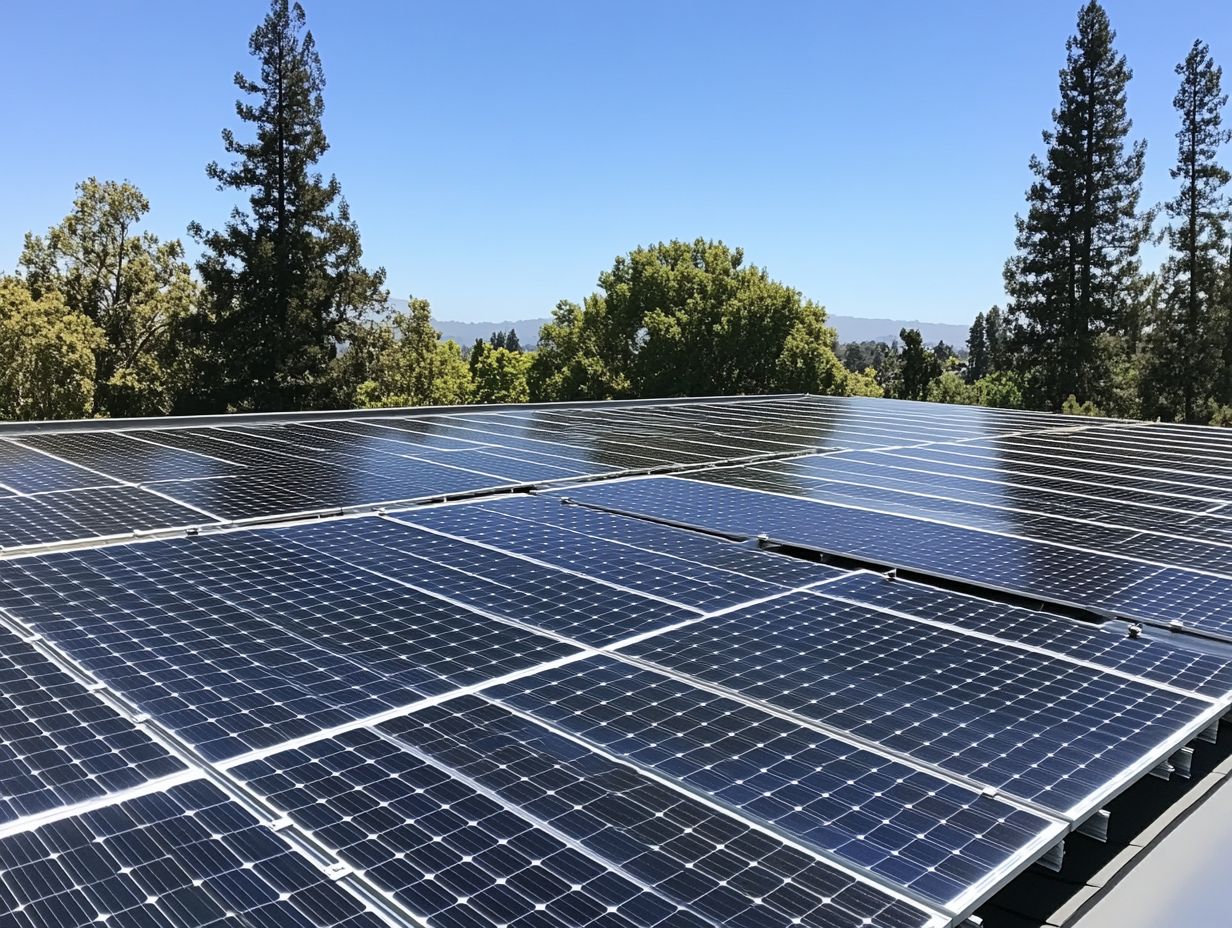
There are several myths surrounding solar panels that may discourage people from considering this renewable energy source. Let’s explore and debunk some of these common myths.
Do Solar Panels Only Work in Sunny Climates?
No, solar panels can still generate electricity on cloudy days. While they work best in direct sunlight, they are effective even in overcast conditions. Solar panels work well in colder climates too, as they rely on sunlight rather than heat.
Is it True That Solar Panels are Expensive?
Many people think this, but here s the exciting truth! Solar panels can actually save you money in the long run. While the initial installation cost may seem high, the savings on your electricity bill and potential tax incentives can make it a worthwhile investment.
Can Solar Panels Only Be Installed on Roofs?
Solar panels can be installed on various surfaces, including roofs, walls, and even the ground. It’s important to assess your property to find the best location for maximum sunlight exposure.
Do Solar Panels Require a Lot of Maintenance?
Solar panels are actually low maintenance. They do not have any moving parts, so there is no need for regular upkeep. The only maintenance required is occasional cleaning to ensure they are free of debris and operating efficiently.
Is it True That Solar Panels Are Not Environmentally Friendly?
This is a common myth perpetuated by those who oppose renewable energy sources. Solar panels do not release any harmful emissions and rely on a renewable energy source the sun. They are a clean and sustainable energy option that can benefit the environment.

